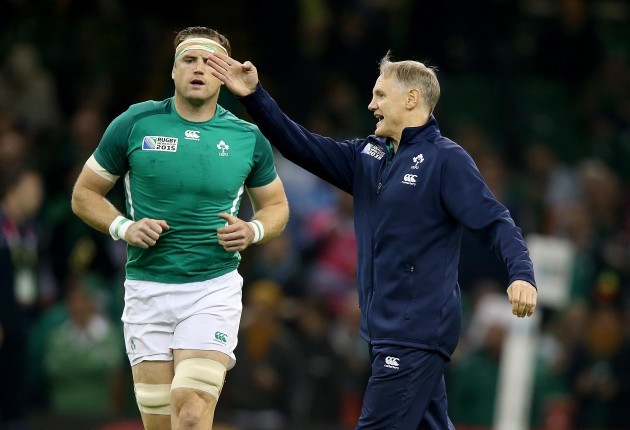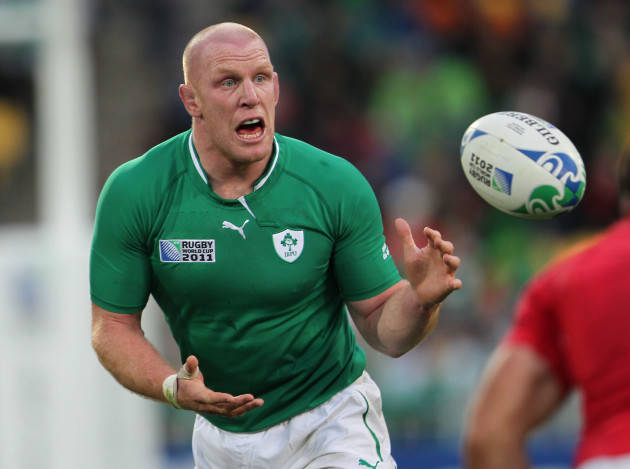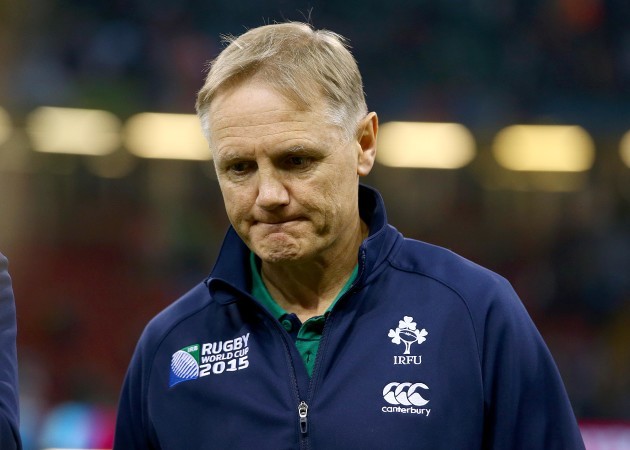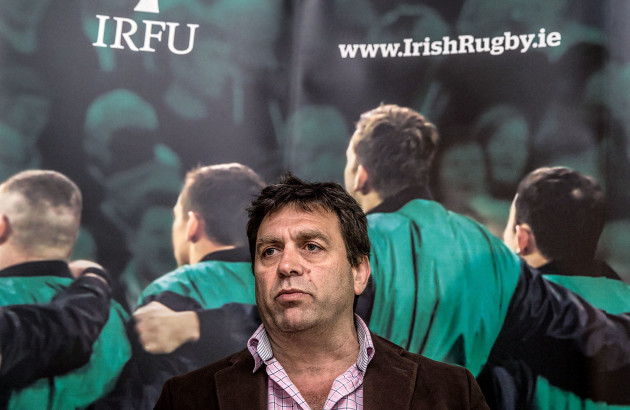Murray Kinsella reports from London
“I HAVEN’T DONE this before. I know I’m going to get a few things wrong, because it is inevitable when you first go into something.”
That was Joe Schmidt at the end of May, specifically speaking about the challenge of selecting 31 players for Ireland’s World Cup campaign. However, the quote sums up Schmidt’s feeling about his first World Cup as a whole, an awareness that he might make errors.
Players, coaches, referees, administrators, media managers, supporters, bookmakers, journalists, humans – all of us make mistakes, every day. Some more than others of course, but consistent perfection is unattainable.
What so often marks out the world-class, the true high achievers, from the rest is an ability to review their performance in detail, analyse the shortcomings, learn how they can be eradicated and move on with confidence intact.
Performance director David Nucifora will lead the IRFU’s review of Ireland’s World Cup exit at the quarter-finals, working alongside Schmidt in the process. Both men are likely to pinpoint errors in Ireland’s coaching approach as they prepare for the 2016 Six Nations and look at a longer-term picture.
It would be fascinating to hear from Schmidt in the coming month or so. Ireland don’t have any media events scheduled in the foreseeable future; it might even be 2016 before Schmidt is wheeled out again.
A positive, proactive move from the IRFU would be to send Schmidt into an interview setting next month, having reviewed Ireland’s World Cup performance, where he might share with us even a watered-down version of how they will be better moving forward.
The supporters are huge stakeholders in all of this, and after forking out thousands of euro to be part of the World Cup – a part so often cited by Ireland’s players as crucial – even a short stint of Schmidt’s time in this context would be appreciated.
Moving on is important of course, but a sixth World Cup quarter-final defeat warrants an in-depth acknowledgement.
The role of luck in sport remains central here. Much as we appear to hate admitting it or focusing on it, luck is essential. Losing all of Paul O’Connell, Johnny Sexton, Sean O’Brien, Peter O’Mahony and Jared Payne for the quarter-final was a nightmare.
Take Agustín Creevy, Nicolas Sánchez, Juan Martín Fernández Lobbe, Pablo Matera and Marcelo Bosch out of the Pumas team and they would have struggled against Ireland. Admittedly Bosch did miss out though suspension, but the point stands.
While acknowledging the absence of luck at a crucial time for Ireland, it can’t be dwelled upon in the review of this World Cup performance. Even without those key men, the final performance from Ireland fell well below their potential.
Hindsight is such a beneficial thing, an unfair advantage, but it is needed to review anything. Few criticised Schmidt and Ireland in the build-up to this tournament; after back-to-back Six Nations titles, it was unwarranted.
Where will Schmidt and Nucifora begin?
They might start by looking at the composition of Ireland’s 31-man squad, where it is admittedly difficult to pick holes. With a defensive mindset continuing in the crucial clash against Argentina, might Andrew Trimble have made sense as one of the wing choices?
What of the team selection for specific games? Schmidt always admits to doubting himself in this department and will pick through the bones of each of his XVs to assess whether he could have made better decisions.
His hands were tied to an extent against the Pumas, but Schmidt will wonder if the evidence he often bases his decisions around pointed to Jack McGrath being a starter, to Iain Henderson being best deployed from the blindside flank, to the evasion of Luke Fitzgerald or Simon Zebo allowing Ireland to offer more threat with ball in hand.
Schmidt cited a lack of experience in his side a number of times post-match, although the fact is that Ireland had more Test caps than the Pumas (admittedly Argentina didn’t play as many Test matches each year before inclusion in the Rugby Championship).
How could Schmidt have ensured the back-up players had more experience? Could Ian Madigan have been trusted to start against Italy as recently as the 2015 Six Nations, when Sexton was absent and Ian Keatley preferred? A full 80 minutes there may have made a difference for Madigan, however small. What other opportunities were missed?
The France game looms large in this failed World Cup. For so long seen as a central point of the campaign, perhaps overly celebrated when victory was secured. Did Ireland peak emotionally for a pool game? Did they invest too much in the preparation for that clash?
The mental game is more important in a World Cup than at any other time in international rugby. Ireland didn’t bring the aggression that should have been a prerequisite for the quarter-final, an aggression we know they are capable of.
Ireland’s tactical approach to this World Cup should be part of the review too, though Schmidt’s blueprint has been effective up until Sunday’s quarter-final defeat. A major overhaul is unlikely, but there must be scope to push the players’ skills further.
It’s untrue to say that the likes of O’Mahony, Sexton, Keith Earls, Jamie Heaslip, and several other Irishmen can’t pass the ball effectively.
They haven’t been pushed to do it in recent years in the big games – and they are some distance behind the Kiwis, Wallabies and Pumas – but there can certainly be short-term gains in this area, a permanent broadening of Ireland’s attacking palate from 2016 onwards.
Defensively, Ireland were cut to ribbons by Argentina in the wide channels as their defence was once again narrow. England, Italy, even Canada clearly identified this as the go-to area against Ireland in the games that preceded the quarter-final defeat.
Surely there could have been a fix before facing a Pumas side who had been playing with width for some time?
Ireland’s approach to dealing with injuries is worth discussing too. It’s understandable to mask and disguise fitness issues from opposition sides until a late stage, but there is also value in openly backing the replacement player early in the week, in saying ‘this is my guy and I have 100% faith in him.’
There are many, many other factors that went into Ireland’s World Cup campaign that were hidden from view, all of which will be dissected. Was Schmidt’s environment too intense? Did he demand too much focus from the players? There’s possibly no clear answer to some of the questions, but they will be asked nonetheless.
Ireland have done so much right under Schmidt, that won’t been forgotten, but a combination of bad luck and mistakes from coaches and players alike must be critically assessed as the Kiwi head coach looks to ensure Ireland retain their Six Nations title next year and begin a new World Cup cycle on a strong foot.




